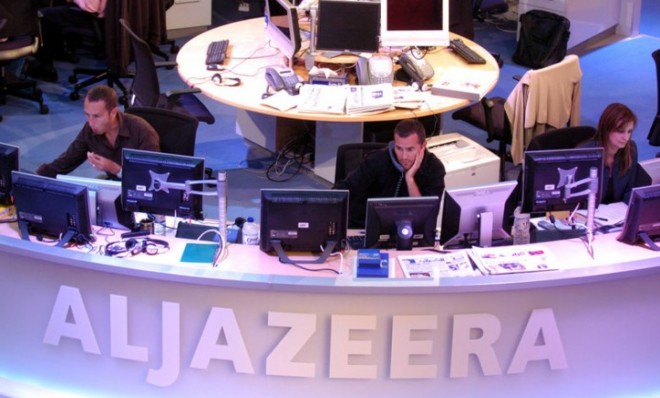Why Al Gore sold Current TV to Al Jazeera
The Qatar-based media giant is buying its way into 40 million U.S. households. But why is Gore cashing out to an oil emirate?


A free daily email with the biggest news stories of the day – and the best features from TheWeek.com
You are now subscribed
Your newsletter sign-up was successful
It's easy enough to understand why Al Jazeera agreed to buy Current TV, the cable network owned by former Vice President Al Gore and business partner Joel Hyatt, on Wednesday: The Qatar-based pan-Arab media conglomerate has struggled to gain access to American viewers, and the acquisition of Current TV — to be shut down and replaced by a new channel based in New York, provisionally named Al Jazeera America — will pipe it into some 40 million U.S. homes. That will put it ahead of its nearest foreign rival, BBC World News, which reaches 25 million American TV sets. Al Jazeera, in announcing the deal, didn't say how much it is paying for the little-watched Current, but The New York Times says the price is about $500 million.
It's less clear why Gore agreed to sell his 7-year-old media experiment to an Arabic news giant that has struggled mightily to convince Americans, U.S. cable providers, and, especially, politicians that it isn't a propaganda outfit for the Gulf emirate that finances it, much less jihadists. Time Warner, for example, said it will be dropping Current-Al Jazeera "as quickly as possible." And it's not like Gore didn't have other offers from less exotic (if not much less controversial) suitors:
Before Al-Jazeera bought Current TV, TheBlaze looked into buying it but we were rejected by progressive owners.glennbeck.com/2013/01/02/did… WG— Glenn Beck (@glennbeck) January 3, 2013
Gore and Hyatt did provide a reason when confirming the sale:
The Week
Escape your echo chamber. Get the facts behind the news, plus analysis from multiple perspectives.

Sign up for The Week's Free Newsletters
From our morning news briefing to a weekly Good News Newsletter, get the best of The Week delivered directly to your inbox.
From our morning news briefing to a weekly Good News Newsletter, get the best of The Week delivered directly to your inbox.
Current Media was built based on a few key goals: To give voice to those who are not typically heard; to speak truth to power; to provide independent and diverse points of view; and to tell the stories that no one else is telling. Al Jazeera has the same goals and, like Current, believes that facts and truth lead to a better understanding of the world around us.
And that rings true to at least a few outside analysts. "There's a major hole right now that Al Jazeera can fill," cable consultant Cathy Rasenberger tells The New York Times. "And that is providing an alternative viewpoint to domestic news, which is very parochial." The risk to Al Jazeera, she adds, is that "there is a limited amount of interest in international news in the United States."
Others are less charitable. Gore's 20 percent stake in Current means he'll probably get a roughly $100 million payout in the deal, and as Allahpundit wryly notes at Hot Air, "I appreciate the irony of one of the high priests of global-warming awareness cashing out to a government built on oil wealth."
But the most probable explanation is that Current was kind of a dud. Gore and Hyatt launched it in 2005 with the idea of airing user-generated content, but then turned it into a sort of second-tier MSNBC in 2011 with the ill-fated hire of Keith Olbermann. Now they're giving up. Current TV still leans left, with shows hosted by Eliot Spitzer, former Michigan Gov. Jennifer Granholm (D), and Cenk Uygur, but there's a reason "Al Jazeera plans to scrap Current's programming lineup and brand, which never caught on with a critical mass of viewers," says Jeff Bercovici at Forbes.
The big question, perhaps, is what Al Jazeera plans to do with its new reach into America. "They could pitch it squarely at the Left as some sort of foreign-policy-heavy adjunct to MSNBC, or they could emphasize kinda sorta straight news reporting on the Arab Spring and Middle East as an alternative to CNN," Hot Air's Allahpundit suggests. Whatever path it takes, "the acquisition is a coming of age moment" for Al Jazeera, says Brian Stelter at The New York Times. The globally successful and well-regarded Arab network has convinced "Gore and the other owners of Current that it has the journalistic muscle and the money to compete head-to-head with CNN and other news channels in the United States." Now it just has to convince Americans to tune in.
A free daily email with the biggest news stories of the day – and the best features from TheWeek.com
Peter has worked as a news and culture writer and editor at The Week since the site's launch in 2008. He covers politics, world affairs, religion and cultural currents. His journalism career began as a copy editor at a financial newswire and has included editorial positions at The New York Times Magazine, Facts on File, and Oregon State University.
-
 Why are election experts taking Trump’s midterm threats seriously?
Why are election experts taking Trump’s midterm threats seriously?IN THE SPOTLIGHT As the president muses about polling place deployments and a centralized electoral system aimed at one-party control, lawmakers are taking this administration at its word
-
 ‘Restaurateurs have become millionaires’
‘Restaurateurs have become millionaires’Instant Opinion Opinion, comment and editorials of the day
-
 Earth is rapidly approaching a ‘hothouse’ trajectory of warming
Earth is rapidly approaching a ‘hothouse’ trajectory of warmingThe explainer It may become impossible to fix
